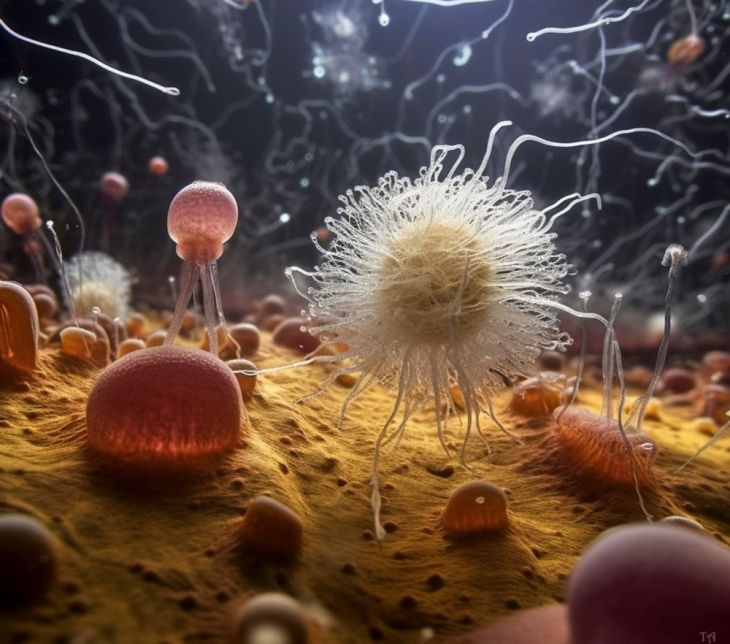The discovery of a "lost world" of ancient organisms that lived in Earth's waterways at least 1.6 billion years ago could change our understanding of our earliest ancestors.
Known as the 'Protosterol Biota', these microscopic creatures are part of a family of organisms called eukaryotes. Eukaryotes have a complex cell structure that includes mitochondria, known as the "powerhouse" of the cell, and a nucleus that acts as the "control and information centre". The Protosterol Biota are believed to be our earliest known ancestors.
Modern forms of eukaryotes that inhabit Earth today include fungi, plants, animals and single-celled organisms such as amoebae. Humans and all other nucleated creatures can trace their ancestral lineage back to the Last Eukaryotic Common Ancestor (LECA). LECA lived more than 1.2 billion years ago.
The discovery of the Protosterol Biota, published in Nature, was made by researchers from The Australian National University (ANU). According to the researchers, these organisms could have been the first predators on Earth.
These ancient creatures were abundant in marine ecosystems across the world and probably shaped ecosystems for much of Earth's history. The researchers say the Protosterol Biota lived at least one billion years before any animal or plant emerged.
"Molecular remains of the Protosterol Biota detected in 1.6-billion-year-old rocks appear to be the oldest remnants of our own lineage - they lived even before LECA," Dr Benjamin Nettersheim, who completed his PhD at ANU and is now based at the University of Bremen in Germany, said.
"These ancient creatures were abundant in marine ecosystems across the world and probably shaped ecosystems for much of Earth's history."
"Modern forms of eukaryotes are so powerful and dominant today that researchers thought they should have conquered the ancient oceans on Earth more than a billion years ago.
"Scientists have long searched for fossilised evidence of these early eukaryotes, but their physical remains are extremely scarce. Earth's ancient oceans rather appeared to be largely a bacterial broth.
"One of the greatest puzzles of early evolution scientists have been trying to answer is: why didn't our highly capable eukaryotic ancestors come to dominate the world's ancient waterways? Where were they hiding?
"Our study flips this theory on its head. We show that the Protosterol Biota were hiding in plain sight and were in fact abundant in the world's ancient oceans and lakes all along. Scientists just didn't know how to look for them - until now."
Professor Jochen Brocks from ANU, who made the discovery with Dr Nettersheim, said the Protosterol Biota were certainly more complex than bacteria and presumably larger, although it's unknown what they looked like.
"We believe they may have been the first predators on Earth, hunting and devouring bacteria," Professor Brocks said.
According to Professor Brocks, these creatures thrived from about 1.6 billion years ago up until about 800 million years ago.
The end of this period in Earth's evolutionary timeline is known as the 'Tonian Transformation', when more advanced nucleated organisms, such as fungi and algae, started to flourish. But exactly when the Protosterol Biota went extinct is unknown.
"The Tonian Transformation is one of the most profound ecological turning points in our planet's history," Professor Brocks said.
"Just as the dinosaurs had to go extinct so that our mammal ancestors could become large and abundant, perhaps the Protosterol Biota had to disappear a billion years earlier to make space for modern eukaryotes."
To make the discovery, the researchers studied fossil fat molecules found inside a 1.6-billion-year-old rock that had formed at the bottom of the ocean near what is now Australia's Northern Territory. The molecules possessed a primordial chemical structure that hinted at the existence of early complex creatures that evolved before LECA and had since gone extinct.
"Without these molecules, we would never have known that the Protosterol Biota existed. Early oceans largely appeared to be a bacterial world, but our new discovery shows that this probably wasn't the case," Dr Nettersheim said.
Professor Brocks said: "Scientists had overlooked these molecules for four decades because they do not conform to typical molecular search images."
"But once we knew what we were looking for, we discovered that dozens of other rocks, taken from billion-year-old waterways across the world, were also oozing with similar fossil molecules."
Dr Nettersheim completed the analysis as part of his PhD at ANU before accepting a position at the University of Bremen. This work involved scientists from Australia, France, Germany and the United States.
AI-generated images of what the Protosterol Biota may have looked like are available here. These images are interpretations only.







